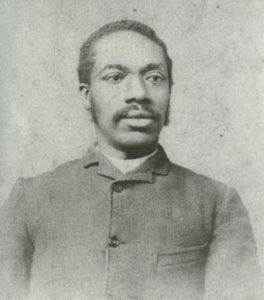
John Wesley Cronwell
*John Wesley Cromwell was born on this date in 1846. He was a Black lawyer, teacher, civil servant, journalist, historian, and activist.
John Wesley Cromwell was born into slavery in Portsmouth, Virginia. He was the youngest of twelve children. His parents were Willis H. and Elizabeth (Carney) Cromwell. Cromwell's father worked as a ferryman on the Elizabeth River and was allowed to keep some of his wages. In 1851, their father purchased freedom for his family, and they moved to Philadelphia in the free state of Pennsylvania.
He attended school there from 1851 to 1856. He moved to a teaching school, the Preparatory Department of the Institute for Colored Youth (Cheyney University), where Ebenezer Bassett was the principal. Cromwell graduated in the summer of 1864. He moved to Columbia, Pennsylvania, that fall in October 1864 to teach. When the school in Columbia closed, Cromwell returned to Portsmouth, Virginia, in April 1865 in the closing days of the American Civil War, starting a private school where Cromwell worked until the fall.
By the end of 1865, Cromwell returned to Philadelphia; he taught at the Baltimore Association for the Moral and Intellectual Improvement of the Colored People, now Bowie State University. In March 1866, the school was attacked and burned to the ground. He continued to work for the organization until May. That month he returned to Virginia, working for the American Missionary Association at Providence Church in Norfolk County, Virginia. It established schools across the South. At this time, he became more active in politics. In Virginia, Cromwell became involved in public affairs. In 1867, Cromwell was in the U.S. District Court Jury Pool and served on the jury on several cases of government officials.
On April 17, 1867, he was a delegate to the Republican convention in Richmond, Virginia, and again to the Republican State convention in Richmond, Virginia, in August. Later that year, he attended the Virginia Constitutional Convention and was elected clerk. In 1869, Cromwell returned to teaching and was an eyewitness to the assassination of Joseph R. Holmes, a fellow member of the Constitutional Convention and a candidate for the Virginia House of Delegates. In 1869 and 1870, he taught at a grade school in Withersville, Virginia. In 1870 Cromwell returned to Richmond as principal of a black school held in Dill's Bakery. In the summer of 1871, he taught a term in Southampton County.
He graduated from Howard University School of Law in March 1874. In 1873, Cromwell married Lucy A. McGuinn of Richmond and had seven children. The couple stressed the importance of education for all their children, who included Otelia, Mary E., Martha, Lucy, John Wesley Jr., and Brent. Cromwell organized a journal, the People's Advocate, which moved to Washington DC the next year. He ran it until 1884. In 1883, he was president of the Bethel Literary Society. He was a member of the Odd Fellows and the Metropolitan AME Church.
He represented the district in the 1884 World's Fair, the Cotton Centennial Exhibition in New Orleans. In 1881, he and Daniel Alexander Payne founded the Bethel Literary and Historical Association, and he served as president in 1883. After his wife Lucy's death in 1892, Cromwell married Annie E. Conn of Mechanicsburg, Pennsylvania. In 1897, Cromwell was a part of the formation of the American Negro Academy. He served as the organization's corresponding secretary until 1919. From 1901 to 1909, he taught and was the principal of several District schools, including Briggs, Garnet, Banneker, and Crummell.
Cromwell was a strong advocate of black-owned businesses and encouraged black economic success. He believed black people should try to frequent black-owned businesses. Cromwell was considered an important statistician and historian later in his life. He had great contempt for efforts to minimize the cost of slavery to blacks in America and focused significant attention on slave insurrections.
Cromwell wrote that Nat Turner's revolt was an example of black people working to "help himself rather than depend on the other human agencies for the protection which could come through his strong arm." Cromwell's 1914 book, The Negro in American History: Men and Women Eminent in the Evolution of the American of African Descent, influenced Carter G. Woodson to create the Association for the Study of Negro Life and History in 1915. Cromwell later published articles in the Journal of Negro History. J
ohn Cromwell died on April 14, 1927.
To Become a Middle School Teacher
To become a High School Teacher